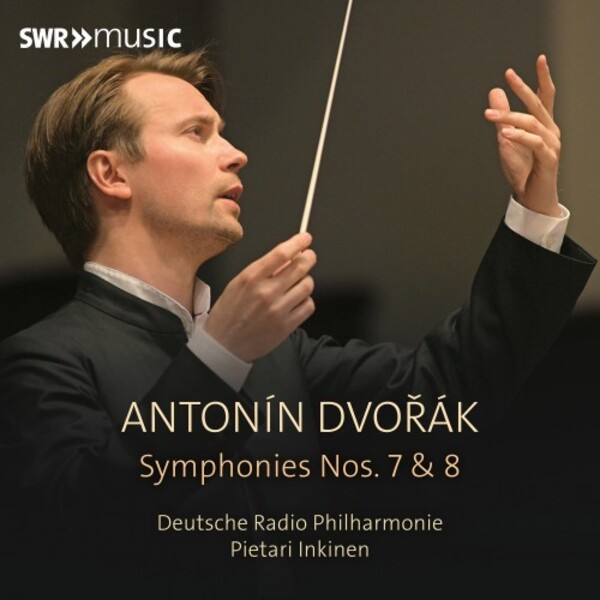DVOŘÁK Symphonies Nos 7 & 8 (Inkinen)
View record and artist detailsRecord and Artist Details
Genre:
Orchestral
Label: SWR Music
Magazine Review Date: 05/2024
Media Format: CD or Download
Media Runtime: 74
Mastering:
DDD
Catalogue Number: SWR19130CD

Tracks:
| Composition | Artist Credit |
|---|---|
| Symphony No. 7 |
Antonín Dvořák, Composer
German Radio Philharmonic Orchestra Pietari Inkinen, Conductor |
| Symphony No. 8 |
Antonín Dvořák, Composer
German Radio Philharmonic Orchestra Pietari Inkinen, Conductor |
Author: David Gutman
Pietari Inkinen has been building an impressive career without the intense media scrutiny accorded some of his Finnish colleagues. While Gramophone readers may remember him best for the Sibelius he conducted in New Zealand for Naxos, his CV includes a five-year stint at the helm of the Prague Symphony Orchestra. He conducted his first Bayreuth Ring last season. Appointed chief conductor of the Deutsche Radio Philharmonie from 2017 (a post he will relinquish during 2025), Inkinen inherited a Dvořák cycle begun under the band’s erstwhile chief, Karel Mark Chichon.
Having already released the Second and Sixth, both with a clutch of rarely recorded overtures, the current team ventures on to more mainstream turf with the present pairing. There is local competition of a kind from Roger Norrington’s Stuttgart coupling (Hänssler Classic, 11/11), his deliberately emaciated timbres a long way from the sturdy warmth of old-school contenders such as Colin Davis in Amsterdam (Philips, 2/77, 10/79).
As might be expected, Inkinen comes somewhere between the two with a fresh, dramatic take on both works. His orchestra’s relatively modest, bass-light sonority is reproduced in vivid, natural recorded sound, woodwind emerging strongly through massed strings rather than disappearing into generalised Mitteleuropean soup. Overlooked inner voices are regularly brought to the fore. Having channelled Wagner as well as Brahms in the Seventh’s slow movement, Inkinen neither undersells the finale’s forward drive nor fudges its rhetoric, the style of articulation nothing if not forthright. If the Eighth’s slow movement initially relaxes a little more, its thunderous interjections certainly hit home. Next up a deftly shaped Allegretto grazioso, the Trio perhaps a trifle impatient. The finale adheres to the ‘eager’ template, at times lending a visceral thrust to familiar arguments.
In short this is cogent, commonsensical, sometimes thrilling music-making, lacking only a degree of serenity and specificity of colour.
Explore the world’s largest classical music catalogue on Apple Music Classical.
Included with an Apple Music subscription. Download now.

Gramophone Digital Club
- Digital Edition
- Digital Archive
- Reviews Database
- Full website access
From £8.75 / month
Subscribe
Gramophone Full Club
- Print Edition
- Digital Edition
- Digital Archive
- Reviews Database
- Full website access
From £11.00 / month
Subscribe
If you are a library, university or other organisation that would be interested in an institutional subscription to Gramophone please click here for further information.




